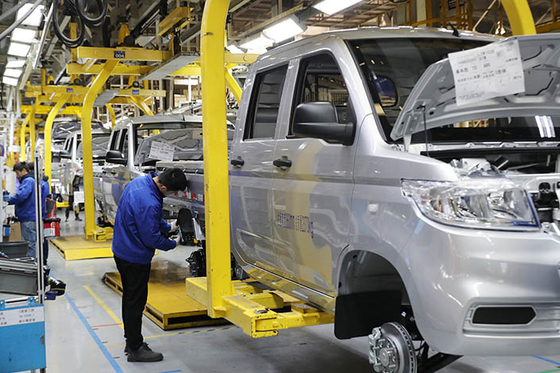Overseas Drive pays off as Chinese auto exports more than double
Chinese auto exports in the first nine months of 2021 more than doubled from the previous year due to the industry recovering from the fallout from the Covid-19 pandemic.
China exported more than 1.36 million vehicles from January to September, according to statistics from the China Association of Automobile Manufacturers (CAAM) released on Tuesday, up from 620,000 during the same period in 2020.
This figure represents a sharp increase from the 910,000 vehicles sold in the first nine months of 2019 before the global spread of the coronavirus put auto sales at the mercy of disrupted supply chains and dampened demand for consumers.
Xu Haidong, deputy chief engineer of CAAM, attributed the growth to the gradual recovery of domestic automobile production after the initial shock of the pandemic and the persistent efforts of Chinese automakers to strengthen overseas investment.
In recent years, a growing number of Chinese automakers have further penetrated overseas markets by establishing or acquiring offshore manufacturing facilities, a move that can help them cut costs and avoid import taxes.
The latest example of this push is Great Wall Motor Co. Ltd., which in August bought a Daimler plant in Brazil as part of its foray into Latin America’s largest economy. The plant will have an annual production capacity of 100,000 cars, according to Great Wall Motor, which also manufactures cars in India and Thailand.
The Baoding-based automaker is also said to be in preliminary talks to take over the Barcelona plant from Nissan Motor Co. Ltd.
Other Chinese-based players have also taken similar approaches, including SAIC Motor Corp. Ltd., FAW Group Co. Ltd. and Dongfeng Motor Group Co. Ltd.
According to statistics on Tuesday, in the nine months to September, new energy vehicles (NEVs), a category that includes electric, plug-in hybrid and hydrogen fuel cell vehicles, accounted for 14.3% of China’s total auto exports, totaling 195,000 vehicles and up 420% year on year.
NEV’s skyrocketing export growth comes more than a year after China raised its NEV sales target for 2025 to a quarter of all car sales from the previously forecast level of 20%. He also cut subsidies for electric cars to encourage local manufacturers to rely on innovation rather than government aid.
NEV’s domestic ambitions therefore gave Chinese electric vehicle manufacturers greater leeway to expand and led to the rapid rise of a group of young brands led by Nio Inc., Xpeng Inc. and Li Auto Inc. ., who have become famous for adopting what they call automated driving technologies in their cars.
On September 30, Nio began selling its flagship ES8 electric SUVs in Norway in its first step to carve out territory in Europe, with plans to introduce its ET7 electric sedan to the country in the second half of the year. next year. In June, Nio received full vehicle type approval for the ES8. The approval is an official license that allows the car to be sold in all EU countries.
Nio’s expansion in Norway came 10 months after Xpeng started handing over its G3 electric SUVs to customers based in the same Scandinavian country.
Besides Europe, Japan is also a hot selling destination for Chinese electric car makers. On Monday, Nikkei Asia announced that a subsidiary of state-owned Dongfeng Motor and other Chinese automakers will supply a total of 10,000 small electric trucks to Japanese logistics company SBS Holdings Inc.
Chinese auto exports will continue to increase as Chinese auto makers have shown signs of leadership in the industry’s move towards full electrification, said Xu of CAAM.
Contact reporter Ding Yi ([email protected]) and editor-in-chief Michael Bellart ([email protected])
To download our app for getting late-breaking alerts and reading news on the go.
To have our free weekly newsletter must read.
You have accessed an article available only to subscribers
SEE OPTIONS

